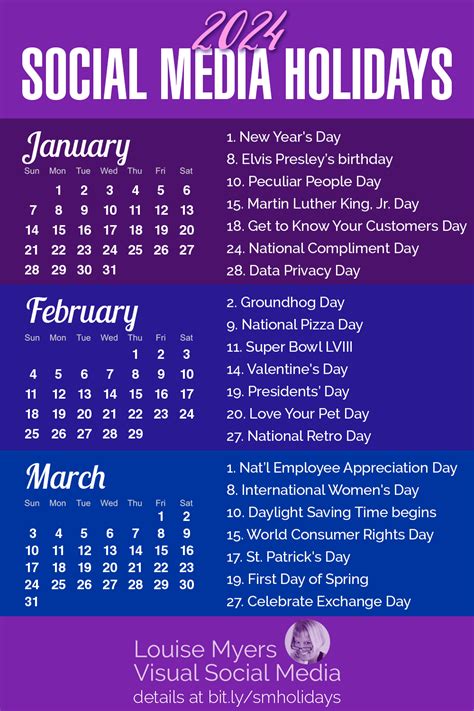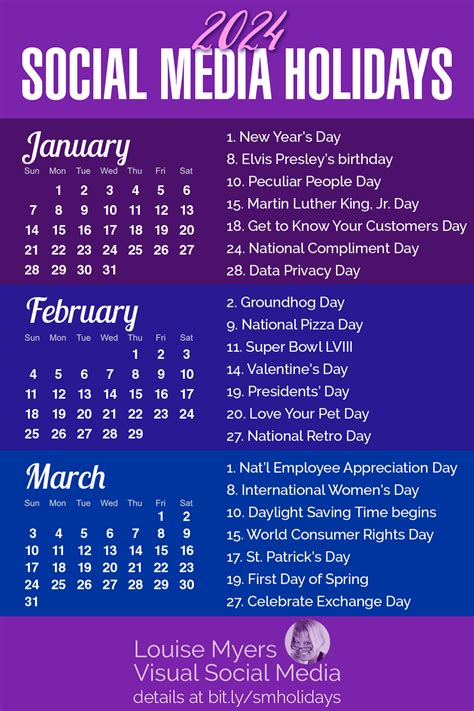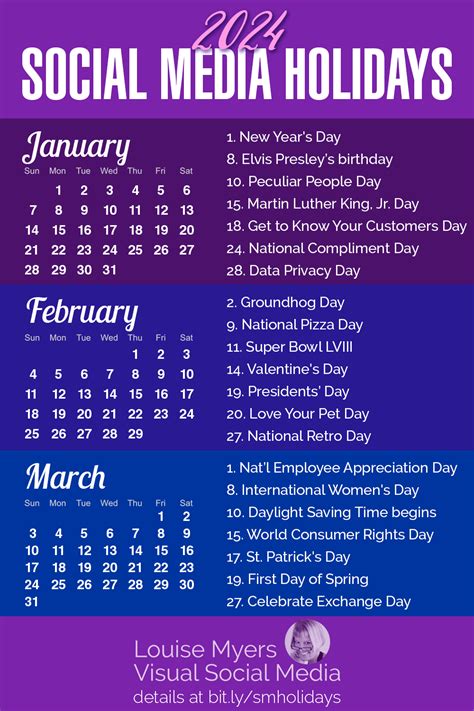Explore the future of social media holidays in 2024 and beyond, from increased user engagement to the impact on digital marketing strategies and ethical considerations. Discover the evolution and integration with virtual reality.Social media holidays have become an integral part of our online culture, with dedicated days to celebrate everything from pets to kindness. But as we look ahead to 2024 and beyond, the landscape of social media holidays is set to undergo a significant transformation. In this blog post, we will explore the evolving nature of social media holidays and their impact on user engagement, consumer behavior, and digital marketing strategies. From the integration of virtual reality to the emergence of new platforms and the influence of AI-driven experiences, the future of social media holidays is poised to be dynamic and ever-changing. We will also delve into the global reach and cultural diversity of these holidays, as well as the ethical considerations and regulations that will shape their evolution. Get ready to dive into the exciting world of social media holidays and discover what the future holds for this unique phenomenon.
Evolution of social media holidays
Social media holidays have come a long way since the early days of platforms like MySpace and Friendster. Over the years, we have witnessed a significant evolution in the way people celebrate and engage with holidays on social media. What started as simple status updates and photo sharing has now transformed into elaborate hashtag campaigns, branded filters, and interactive AR experiences.
With the rise of influencer marketing, we have seen an increased user engagement during social media holidays. Influencers now play a key role in shaping the way people celebrate holidays online, often collaborating with brands to create unique and shareable content. This has led to a more immersive and participatory experience for users, as they are now actively involved in shaping the narrative of these holidays.
As we look towards the future, the integration with virtual reality is likely to play a significant role in the evolution of social media holidays. Imagine being able to virtually attend a holiday parade or explore a festive market from the comfort of your own home. Virtual reality has the potential to bring people together in new and exciting ways, redefining the very concept of holiday celebrations.
In conclusion, the evolution of social media holidays has been a fascinating journey, and we can expect even more innovative developments in the years to come. From AR filters to virtual reality experiences, the ways in which we celebrate and engage with holidays on social media are constantly evolving, creating new opportunities for brands and users alike.
Increased user engagement
In the ever-evolving landscape of social media, the concept of user engagement has become a critical aspect for platforms and brands alike. With the rapid advancement of technology and the growing influence of social media in people’s daily lives, the need to capture and retain the attention of users has never been more important. This is why platforms are constantly striving to enhance the user experience and provide features that encourage active participation, interaction, and meaningful connections.
One of the key ways in which social media has increased user engagement is by leveraging the power of personalized content creation. By utilizing data analytics and machine learning algorithms, platforms are able to deliver content that is tailored to the individual preferences and interests of users. This not only enhances the overall user experience but also fosters a sense of connection and relevance, as users are more likely to engage with content that resonates with them on a personal level.
In addition to personalized content, the integration of virtual reality has also played a significant role in boosting user engagement. With virtual reality, users are able to immerse themselves in interactive and immersive experiences, thereby increasing the time spent on platforms and the level of engagement with the content. Whether it’s through virtual tours, live events, or gaming experiences, virtual reality has the potential to revolutionize the way users engage with social media.
Furthermore, the emergence of new platforms and the evolution of social media holidays have further contributed to increased user engagement. As platforms continue to diversify and expand, users are provided with more options for connecting with others, sharing their experiences, and participating in online communities. Social media holidays, in particular, have proven to be powerful tools for driving user engagement, as they create opportunities for users to express themselves, join in collective celebrations, and interact with brands in innovative ways.
Integration with virtual reality
In the year 2024 and beyond, the integration with virtual reality is expected to revolutionize the way people interact on social media platforms. With the advancement in technology, VR devices will become more accessible to the general public, leading to a surge in virtual reality experiences on social media. This integration will allow users to immerse themselves in 360-degree videos and interactive VR content, creating a more immersive and engaging social media experience.
Furthermore, social media platforms will be able to use VR technology to create virtual communities, events, and meetings, providing users with a sense of presence and connectivity that goes beyond the traditional 2D interface. Users will have the ability to attend virtual concerts, conferences, and gatherings, all within the virtual reality space of their favorite social media platforms.
Additionally, brands and businesses will leverage the integration with virtual reality to create innovative and interactive advertising campaigns. Through VR experiences, companies can offer virtual product demonstrations, immersive storytelling, and virtual shopping experiences, allowing consumers to engage with brands in a whole new dimension.
As the integration with virtual reality continues to evolve, social media platforms will need to adapt and develop new features and tools to fully utilize this technology, paving the way for a new era of social media interaction.
Influence on consumer behavior
Social media has revolutionized the way consumers make purchasing decisions. With the influence of platforms like Facebook, Instagram, and Twitter, consumers are constantly bombarded with advertisements, brand promotions, and peer recommendations. This has led to a shift in consumer behavior, as individuals are now heavily reliant on social media to research products, read reviews, and compare prices before making a purchase.
Additionally, the rise of influencer marketing has significantly impacted consumer behavior. Social media influencers, who have amassed large followings, have the power to sway consumer opinions and purchasing decisions. This has created a new level of trust and authenticity in the purchase journey, as consumers look to influencers for product recommendations and endorsements.
Furthermore, social media has also propelled the concept of FOMO (fear of missing out) among consumers. Through the use of carefully crafted content and promotions, brands are able to create a sense of urgency and exclusivity, leading consumers to make impulse purchases in order to feel included and up to date with the latest trends.
In conclusion, the influence of social media on consumer behavior is undeniable. As platforms continue to evolve, so too will the way in which consumers interact with brands and make purchasing decisions. It is crucial for businesses to understand and leverage the power of social media in order to stay competitive in the ever-changing consumer landscape.
Global reach and cultural diversity
In the year 2024 and beyond, social media holidays are expected to continue expanding their global reach and embracing cultural diversity like never before. With the advancement of technology and the widespread availability of high-speed internet, social media platforms have the ability to connect people from different corners of the world, allowing them to share their traditions, customs, and values with each other.
Not only do these platforms offer a space for individuals to express themselves, but they also serve as a medium for businesses to understand and tap into various cultural markets. This increased user engagement on a global scale presents new opportunities for brands to create content that resonates with diverse audiences.
As influence on consumer behavior continues to be shaped by social media, the recognition and celebration of international holidays and cultural events will be an integral part of the digital landscape. This fosters a sense of unity and understanding among people of different backgrounds, ultimately contributing to a more inclusive and interconnected online community.
| Benefits of global reach and cultural diversity in social media holidays: |
|---|
|
|
|
|
|
|
|
|
Emergence of new platforms
Social media has seen a constant evolution ever since its inception, and one of the most significant developments in recent years has been the emergence of new platforms. These platforms have redefined the way people connect, share, and consume content, expanding the possibilities of social networking and digital interaction. With the introduction of new platforms, users have more options to engage with different types of media and connect with diverse communities.
Furthermore, the rise of new platforms has also led to increased competition in the social media landscape, prompting existing platforms to innovate and adapt in order to retain their user base. This has driven the development of new features, tools, and functionalities, enhancing the overall user experience across various platforms.
Additionally, the emergence of new platforms has paved the way for niche-focused networks catering to specific interests and demographics. This has fostered a more personalized and targeted approach to social media engagement, allowing users to connect with like-minded individuals and access content tailored to their preferences.
In conclusion, the emergence of new platforms has brought about a dynamic shift in the social media landscape, offering users a diverse array of options for digital interaction and content consumption. As we look towards the future, it is evident that the ongoing development of new platforms will continue to shape the way we engage with social media and connect with others in the digital realm.
Personalized content creation
In the fast-paced world of social media, personalized content creation has become an essential strategy for brands to connect with their audience. Gone are the days of one-size-fits-all marketing messages. Now, companies are leveraging data and analytics to tailor their content to the preferences and interests of individual users.
By using personalization, brands can create a more meaningful and relevant experience for their followers, which can lead to increased engagement and loyalty. Whether it’s through targeted ads, customized product recommendations, or tailored social media posts, personalized content allows brands to foster a deeper connection with their audience.
Moreover, with the advancement of technology, personalization has become more sophisticated, enabling brands to deliver hyper-targeted content at scale. From dynamic content that adapts based on user behavior to real-time, AI-driven personalization, the future of personalized content creation in social media is boundless.
In the coming years, we can expect to see brands further refine their personalization strategies, harnessing the power of data and AI to deliver even more tailored experiences to their audience. As social media continues to evolve, personalized content creation will undoubtedly play a pivotal role in shaping the digital marketing landscape.
Impact on digital marketing strategies
Social media holidays have significantly impacted digital marketing strategies over the years, and this trend is expected to continue well into 2024 and beyond. The ability of brands to leverage these holidays for marketing purposes has provided new opportunities for reaching and engaging with their target audience.
With the rise of social media holidays, brands have had to rethink their approach to marketing and adapt to the changing landscape of digital advertising. They are now required to create more personalized and relevant content that resonates with their audience, taking into account the themes and messages associated with these holidays.
Furthermore, the integration of social media holidays with digital marketing strategies has led to the need for brands to be more agile and responsive in their marketing efforts. The real-time nature of these holidays requires brands to be quick to react and take advantage of the increased user engagement that often comes with these events.
In conclusion, as social media holidays continue to evolve and become a key part of the online culture, the impact on digital marketing strategies will only continue to grow. Brands will need to stay ahead of the game by being creative, adaptive, and in tune with the latest trends in order to make the most of these marketing opportunities.
Regulation and ethical considerations
Social media has become an integral part of our daily lives, influencing the way we interact, consume information, and make purchasing decisions. As social media platforms continue to evolve and expand their influence, regulation and ethical considerations have become increasingly important. With the rapid growth of social media, there is a need for clear guidelines and regulations to ensure the safety and privacy of users. Furthermore, ethical considerations are crucial in determining the impact of social media on society as a whole.
In recent years, there have been numerous instances of data breaches, privacy violations, and the spread of misinformation on social media platforms. This has led to calls for greater regulation to hold these platforms accountable for the content that is shared on their networks. Additionally, ethical considerations such as the use of personal data for targeted advertising and the manipulation of algorithms to control the dissemination of information have raised concerns about the influence of social media on individuals and societal values.
As we look towards the future of social media holidays in 2024 and beyond, it is essential to consider the potential impact of regulation and ethical considerations on the development of new platforms and the creation of personalized content. The implementation of clear regulations and ethical guidelines can help promote transparency, accountability, and responsible behavior among social media companies, ultimately leading to a more positive and safe online environment for users.
AI-driven social media holiday experiences
In 2024 and beyond, the future of social media holidays is expected to be heavily influenced by AI-driven experiences. With the advancement of artificial intelligence technology, social media platforms are poised to offer users personalized and immersive holiday experiences like never before. Artificial intelligence will play a critical role in analyzing user data and behavior to tailor holiday-themed content and interactions.
Additionally, AI will enable social media platforms to create virtual reality experiences that allow users to participate in holiday celebrations from around the world, regardless of their physical location. This integration with virtual reality will greatly enhance user engagement and provide a truly immersive and unforgettable social media holiday experience.
Furthermore, the global reach and cultural diversity of social media holidays will be expanded through AI-driven content translation and localization. Users will be able to connect with others from different cultures and backgrounds, fostering a sense of unity and inclusivity during holiday celebrations.
In conclusion, as social media continues to evolve, AI-driven experiences are set to revolutionize the way we celebrate holidays online. The combination of artificial intelligence, virtual reality integration, and global cultural diversity will pave the way for a new era of social media holiday experiences that are both personalized and universally accessible.
Frequently Asked Questions
What are social media holidays?
Social media holidays are specific days or events that are celebrated or recognized on various social media platforms, often with the use of hashtags and user-generated content.
Why are social media holidays important?
Social media holidays help brands and individuals to engage with their audience, create relevant content, and participate in conversations that are important to their target audience.
How have social media holidays evolved in recent years?
Social media holidays have evolved from simple awareness days to global movements, with an emphasis on inclusivity, diversity, and social causes. They have also become more integrated with e-commerce and influencer marketing.
What will the future of social media holidays look like in 2024 and beyond?
In the future, social media holidays are likely to continue growing in importance, with an even greater focus on authenticity, community-driven initiatives, and the use of augmented reality and virtual reality experiences.
How can brands effectively participate in social media holidays?
Brands can participate in social media holidays by understanding their audience, aligning with relevant causes or themes, creating meaningful and engaging content, and leveraging influencer partnerships.
What are some examples of successful social media holiday campaigns?
Examples of successful social media holiday campaigns include Starbucks’ annual #RedCupContest for the holiday season, Earth Day initiatives by environmental organizations, and Pride Month campaigns that support the LGBTQ+ community.
What role will emerging technologies play in shaping the future of social media holidays?
Emerging technologies such as augmented reality, virtual reality, and artificial intelligence will likely enhance the interactive and immersive experiences of social media holidays, offering new ways for users to participate and engage with branded content.



